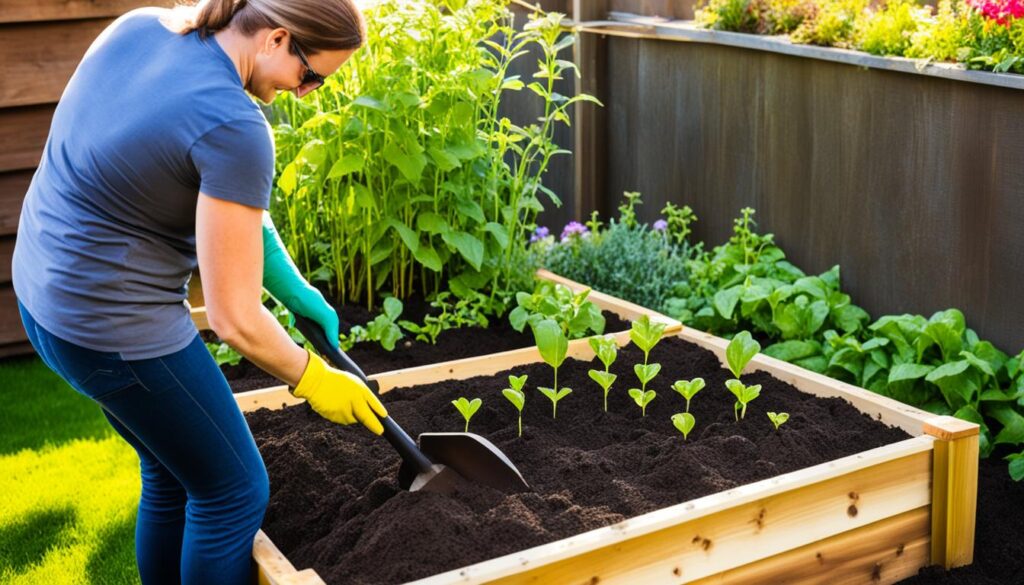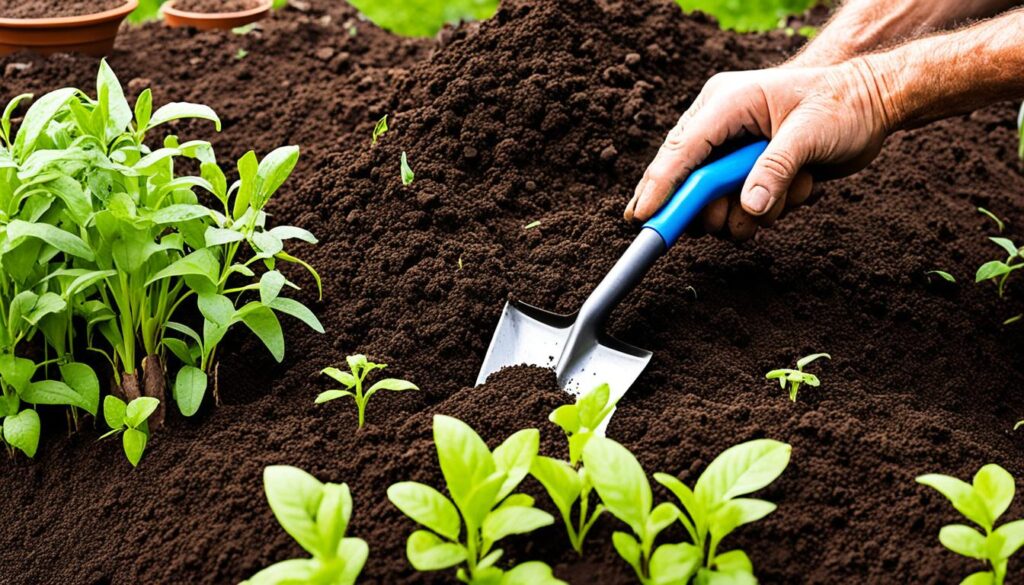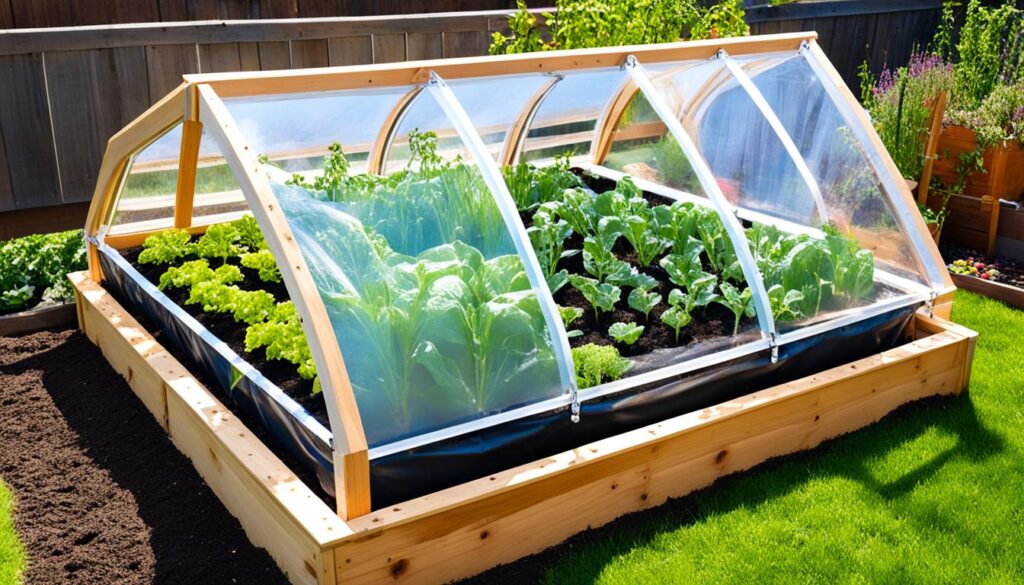Gardening is not just a hobby; it has numerous benefits for your mental wellbeing, stress relief, and physical health. Engaging in gardening provides a form of outdoor therapy that allows you to connect with nature and find solace in its beauty. As you immerse yourself in the world of gardening, you will discover the joy and mindfulness it brings, ultimately leading to a sense of happiness and fulfillment.
When you garden, you create a space where your mind can unwind and find peace. The act of nurturing plants and watching them thrive brings a sense of satisfaction and accomplishment. By connecting with nature, you can escape the stresses of everyday life and find tranquility in the beauty of the natural world.
Key Takeaways:
- Gardening provides numerous benefits for mental wellbeing, stress relief, and physical health.
- Engaging in gardening allows you to connect with nature and find solace in its beauty.
- Gardening brings a sense of mindfulness and fulfillment.
- Creating a garden space allows you to escape everyday stresses and find tranquility.
- Watching plants thrive brings a sense of satisfaction and accomplishment.
Boosting Serotonin Levels Through Gardening
Research has revealed an interesting connection between gardening and serotonin levels in the brain. Serotonin, often referred to as the “happy chemical,” acts as a natural antidepressant and plays a vital role in strengthening the immune system. Getting your hands dirty in the garden can stimulate the release of serotonin, leading to a boost in mood and overall wellbeing.
One of the key factors contributing to this increase in serotonin is contact with soil. Soil contains a unique bacterium called Mycobacterium vaccae, which has been found to have a positive impact on mental health. When we come into contact with this bacterium through gardening activities, it triggers the release of serotonin in the brain, promoting feelings of happiness and relaxation.
It is interesting to note that a deficiency in serotonin levels is associated with depression. By engaging in gardening and maintaining contact with soil, individuals can naturally elevate their serotonin levels, potentially alleviating symptoms of depression and enhancing their overall mental wellbeing.
The Immune System Connection
In addition to its positive effects on mental health, serotonin also contributes to a strengthened immune system. A robust immune system is essential for maintaining optimal health and protecting the body against various diseases and infections. Gardening, with its ability to increase serotonin levels, can indirectly support a healthy immune system.
“Gardening is not only good for growing plants, but also for growing a happier and healthier you.”
So, if you’ve been feeling down or stressed, consider spending some time in the garden. Engaging in gardening activities offers not only the chance to grow beautiful plants but also the opportunity to cultivate happiness and improve mental wellbeing through increased serotonin levels.
The Dopamine High of Harvesting in the Garden
When we harvest products from the garden, there is a release of dopamine in the brain. This response evolved from our ancestors’ hunter-gatherer days, where finding food triggered a surge of dopamine in the reward centre of the brain, leading to a state of bliss or mild euphoria. This dopamine release can be triggered by sight, smell, and the action of actually plucking the fruit. Dopamine responses are also linked with addictive and impulsive behaviour.
Harvesting fresh produce from the garden elicits a sense of satisfaction and joy that can’t be replicated elsewhere. The rush of dopamine flooding our brains as we pick and gather the fruits of our labor is a tangible reward. It’s no wonder that gardening enthusiasts are often drawn into a blissful state, experiencing the euphoria associated with dopamine release.
The Bliss of Harvesting
Sight, smell, and touch can all contribute to the dopamine high experienced during harvesting. The vibrant colours of ripe tomatoes or juicy strawberries catch our eyes and signal the reward awaiting us. The aroma released by freshly plucked herbs or the sweet scent of ripe fruits can awaken our senses, intensifying the pleasure. And the tactile act of picking, feeling the weight of the produce in our hands, is both gratifying and exhilarating. These sensory experiences amplify the brain’s dopamine response, heightening our blissful state.
Dopamine plays a significant role in addiction as well. The rewarding feeling experienced during harvesting can create a desire to repeat this pleasurable activity, leading to a potential addiction to gardening. The intense satisfaction derived from harvesting can trigger impulsive behaviours, driving individuals to spend more time in the garden and seek out additional rewards.
“The dopamine high experienced during harvesting in the garden is a powerful force that keeps gardeners coming back for more.” – Gardening Enthusiast
The Case for Organic Gardening
When it comes to gardening, using organic soil and avoiding glyphosate-based herbicides like Roundup is essential for maintaining optimal levels of serotonin and dopamine in the body. Research has shown that glyphosate residues found in non-organic foods can deplete serotonin and dopamine levels in mammals, affecting our overall mental wellbeing.
Glyphosate and Roundup ingredients have the ability to persist in the environment, as well as in the cells and organs of animals. This raises concerns about the potential long-term effects on serotonin and dopamine production in the body. To ensure we maintain these crucial neurotransmitters at healthy levels, choosing organic gardening methods becomes even more important.

Organic gardening provides a natural solution that avoids the risks associated with synthetic herbicides. By utilizing organic soil enriched with natural nutrients, we create a harmonious environment that supports the growth of plants without the need for harmful chemicals. This not only benefits our own health but also helps to protect the environment and promote sustainable agriculture.
Avoiding the use of glyphosate-based herbicides and opting for organic gardening methods ensures that our fruits, vegetables, and herbs are free from harmful residues. By consuming non-organic foods grown with glyphosates, we expose ourselves to potential disruptions in serotonin and dopamine levels, which can negatively impact our mental and emotional wellbeing.
The Benefits of Organic Gardening:
- Promotes healthy serotonin and dopamine levels
- Avoids glyphosate residues
- Protects the environment
- Supports sustainable agriculture
- Provides chemical-free produce
Choosing organic gardening methods not only benefits our own health but also contributes to a sustainable and eco-friendly approach to food production. By embracing organic gardening practices, we can cultivate a healthier and happier life for ourselves and our communities.
Gardening and Mental Wellbeing
Gardening can have a profound impact on our mental wellbeing, offering benefits similar to the Japanese practice of “forest bathing.” When we engage in gardening, we have the opportunity to focus and practice mindfulness, which helps us disconnect from distractions and be more present in our surroundings.
“Gardening is a delightful way to escape the noise of everyday life and find peace in the beauty of nature.”
As we immerse ourselves in the gardening process, we cultivate a sense of purpose and satisfaction. The act of caring for something other than ourselves can lead to increased life satisfaction and overall mental wellness.
But what is it about gardening that makes it so beneficial? One factor is the presence of mycobacterium, a type of bacteria found in soil. Research has shown that exposure to mycobacterium can improve brain function and mood.
Additionally, gardening offers a respite from the constant demands of technology and screens. Spending time in nature and tending to plants allows us to connect with the earth and nourish our souls. It provides a sense of grounding and a chance to recharge mentally and emotionally.
Finding Focus and Mindfulness
Gardening requires our full attention, whether we are sowing seeds, pruning plants, or tending to flowers. This focus allows us to escape the constant stream of thoughts and worries that often occupy our minds.
As we engage in gardening tasks, such as carefully trimming a rose bush or arranging a bouquet of fresh blooms, we become fully present in the moment. This presence cultivates a state of mindfulness, where we are aware of our thoughts, feelings, and sensations without judgment.
By practicing mindfulness in the garden, we create space for relaxation and find solace in the beauty of nature. It is an opportunity to slow down, breathe deeply, and appreciate the intricacies of the natural world.
The Power of Mycobacterium
One fascinating aspect of gardening is the hidden influence of mycobacterium. These beneficial bacteria can be found in the soil and have been linked to various health benefits, including enhanced cognitive function and mood regulation.
Mycobacterium acts as a natural antidepressant, releasing chemicals in the brain that promote feelings of happiness and positivity. It is believed that the bacteria stimulate the production of serotonin, the neurotransmitter associated with mood regulation.
So, when we get our hands in the soil while gardening, we not only nourish our plants but also ourselves. The presence of mycobacterium can contribute to our mental wellbeing, leaving us feeling happier, calmer, and more content.
| Benefits of Gardening for Mental Wellbeing |
|---|
| Mindfulness and focus |
| Improved brain function and mood |
| Increased life satisfaction |
| Natural antidepressant effects |
Gardening provides a holistic approach to nurturing our mental health. It combines the benefits of mindfulness, focus, and connection with nature, along with the positive impact of mycobacterium on our brain function and mood.
So, whether you have a small garden, a balcony, or even just a few pots, harness the power of gardening to enhance your mental wellbeing. Take a moment to step outside, breathe in the fresh air, and let the healing energy of nature surround you. Your mind, body, and soul will thank you.

Enjoying Gardening Without a Backyard
Lack of a backyard should not deter individuals from enjoying the therapeutic benefits of gardening. Fortunately, there are alternative options available, such as container gardening, that are perfect for those with limited space. With container gardening, you can create a beautiful and thriving garden right on your balcony or patio.
Utilizing balconies as a space for planters is a fantastic way to bring greenery into your urban living environment. By carefully selecting the right planters and plant varieties, you can create a vibrant balcony garden that adds charm and tranquility to your outdoor space.
When planning your balcony garden, it is crucial to consider the sunlight requirements of your plants. Paying attention to the direction of sunlight based on your hemisphere will help you position your planters in areas that receive adequate light.

To further enhance the appeal of your balcony garden, you can incorporate a variety of planters in different sizes, shapes, and materials. Mix and match various plant species to create a visually striking display that reflects your personal style and preferences.
Creating a small garden on your balcony brings nature closer to you, allowing you to enjoy the beauty and serenity of plants even without a backyard. It’s a wonderful way to connect with nature and find solace in the midst of urban living.
Create a Balcony Garden Checklist
- Choose appropriate planters that fit your balcony’s design and space.
- Select plants based on their sunlight requirements and your level of gardening experience.
- Consider the types of plants you want to grow, such as flowers, herbs, or vegetables.
- Ensure the drainage system on your balcony is effective to prevent water accumulation.
- Regularly water and care for your plants to promote growth and longevity.
| Advantages of Container Gardening on Balconies | Considerations for Successful Balcony Gardening |
|---|---|
| 1. Utilizes limited space efficiently. | 1. Evaluate the weight-bearing capacity of your balcony before placing heavy planters. |
| 2. Provides the opportunity to express your creativity and style. | 2. Choose plants that can withstand varying weather conditions, such as wind and temperature fluctuations. |
| 3. Brings nature closer to your everyday living environment. | 3. Check local regulations or building restrictions regarding balcony gardens. |
| 4. Easy maintenance with less risk of pests and diseases. | 4. Be mindful of watering needs and potential water runoff affecting neighbors below. |
Embrace the possibilities of container gardening on your balcony and immerse yourself in the wonders of nurturing plants, no matter the size of your outdoor space. Experience the joy of cultivating a mini oasis at home and reap the rewards of connecting with nature.
Gardening as a Form of Therapy
Gardening has been recognized as a form of therapy, also known as horticultural therapy. Through research, it has been established that gardening can have a significant positive impact on mental health and overall well-being. The therapeutic benefits of gardening extend beyond mere plant cultivation, offering a range of health outcomes for individuals from various walks of life.
One of the key mental health benefits of gardening is the reduction of depression and anxiety. Engaging in horticultural therapy provides individuals with a nurturing and fulfilling activity that promotes a sense of calmness and relaxation. The act of tending to plants and being surrounded by natural elements enhances mental well-being, allowing individuals to find solace, peace, and stability in the process.
Moreover, gardening has been found to increase life satisfaction. The act of nurturing plants and witnessing their growth and development fosters a sense of accomplishment and purpose. As individuals invest time and effort in their gardens, they experience a profound satisfaction from seeing their hard work translate into tangible results.
Gardening also offers a unique opportunity to cultivate a sense of community. Whether it’s participating in community gardening initiatives or sharing gardening experiences with friends and neighbors, this activity brings people together. Through gardening, individuals can connect with others, exchange knowledge, and build meaningful relationships, fostering a strong sense of community and belonging.
Furthermore, horticultural therapy has been shown to have positive effects on cognitive function and psychological well-being. Engaging in gardening activities stimulates the brain, promoting mental agility, focus, and problem-solving skills. Additionally, the meditative nature of gardening encourages mindfulness, allowing individuals to be fully present in the moment and experience a sense of peace and tranquility.
“Gardening has the power to heal our minds and bodies, creating a sense of purpose, joy, and connection with nature. It’s a form of therapy that can truly transform lives.” – Horticultural Therapist
The Therapeutic Power of Gardening: A Summary
- Reduced depression and anxiety
- Increased life satisfaction
- Enhanced sense of community
- Improved cognitive function
- Promotes psychological well-being
Overall, horticultural therapy has proven to be a valuable tool in promoting mental health, improving overall life satisfaction, fostering a sense of community, and enhancing cognitive function. Whether it’s cultivating a small garden or participating in community gardening initiatives, individuals can leverage the therapeutic power of gardening to find solace, purpose, and joy.
The Power of Digging in the Dirt
When it comes to gardening, there’s something truly special about digging in the dirt. Not only does it reconnect us with nature, but it also offers a multitude of benefits for our overall wellbeing. One of these benefits lies in the power of microbes found in the soil.
When we dig in the dirt, we come into direct contact with these microscopic organisms, known as microbes. These tiny creatures have a profound impact on our bodies and minds. In fact, inhaling these microbes can stimulate the production of serotonin in the brain.
Serotonin, often referred to as the “happy chemical,” is responsible for regulating mood, promoting relaxation, and inducing a sense of happiness. By digging in the dirt, we unknowingly invite these beneficial microbes into our system, triggering a boost in serotonin production.
This surge of serotonin not only helps us relax and unwind but also contributes to an overall sense of happiness. As we delve deeper into the earth, we connect with the natural world around us and experience the therapeutic effects of gardening.
We experience the joy of nurturing living organisms and witnessing their growth firsthand. This connection with nature allows us to immerse ourselves in the present moment and find solace and contentment in the simplicity of the gardening process.
So, the next time you find yourself reaching for a spade and sinking it into the soil, remember that you’re not just digging. You’re embarking on a journey of self-discovery and relaxation, guided by the magical power of microbes. Take a moment to breathe in the earthy scent, feel the soil beneath your fingertips, and embrace the happiness that comes with connecting with nature.
The Joy of Gardening as a Responsibility
Gardening is not just about planting and nurturing plants; it also comes with a sense of responsibility for their care and survival. This responsibility can be incredibly gratifying and purposeful, as it allows me to witness the growth and transformation of plants from tiny seeds to beautiful, blossoming shrubs.
One of the most rewarding aspects of gardening is the ability to enjoy the fruits of my labor. Harvesting fresh vegetables from the garden and savoring their delicious flavors brings a deep sense of satisfaction. Not only am I caring for plants, but I am also providing myself with free, nutritious food.
Caring for plants is a nurturing act, and it gives me a sense of purpose. It’s a reminder that I have the power to care for and nurture living things, and in return, they provide me with beauty, sustenance, and a connection to the natural world.
Gardening teaches me about the importance of responsibility and accountability. I learn to be attentive to the needs of my plants, such as providing water, sunlight, and proper care to ensure their growth and health. This sense of responsibility extends beyond the garden and positively impacts other areas of my life.
Whether I’m tending to a small herb garden on my balcony or cultivating a larger plot of land, the act of gardening fills me with a sense of purpose and accomplishment. It encourages me to slow down, be present in the moment, and appreciate the beauty and resilience of nature.
The Gratifying Cycle of Gardening
Gardening creates a beautiful cycle of care and gratification. When I take responsibility for the well-being of my plants, they reward me with their growth and beauty. Witnessing the results of my hard work and nurturing efforts brings a sense of accomplishment and joy.
Whether I am growing flowers, herbs, or vegetables, gardening offers a fulfilling experience and a tangible reminder of the rewards that come from caring for living things.
Gardening for All
Whether you have a small domestic garden or participate in community gardening initiatives, gardening is accessible to everyone. Engaging in this activity not only allows you to enjoy the beauty and tranquility of your own backyard, but also provides mental health benefits that contribute to overall wellbeing.
Gardening in your domestic garden offers a personal space where you can connect with nature, tend to plants, and find solace. It provides a sense of ownership and accomplishment as you watch your plants grow and flourish. Your garden becomes a sanctuary where you can escape the stresses of daily life and find peace in the beauty of nature.
For those without access to a personal garden, community gardening initiatives offer an equally rewarding experience. Working alongside others in a shared space creates a sense of community and fosters social connections. You can exchange gardening tips, learn from others, and form lasting friendships. Community gardens also provide an opportunity to contribute to the local environment and promote sustainability.
Scientific studies have shown that gardening has significant mental health benefits. It can reduce stress, anxiety, and depression, while promoting relaxation and a sense of purpose. Engaging with plants and being surrounded by greenery has a calming effect on the mind, improving overall wellbeing. Gardening also encourages physical activity, which further enhances mental health and contributes to a balanced lifestyle.
So whether you have a small plot or join a community gardening project, take advantage of the mental health benefits that gardening has to offer. Start your own domestic garden or get involved in a local community garden to nurture your mind, body, and soul.
| Benefits of Domestic Gardening | Benefits of Community Gardening |
|---|---|
|
|
Final Thoughts on Gardening’s Happiness Factor
While gardening has been found to have a positive impact on mental wellness, it is important to note that it should not replace professional care. Gardening can be a valuable complement to existing support systems. For individuals facing mental health challenges, there are a variety of resources available that can provide additional support.
Gardening is a meaningful and enjoyable activity that can contribute to overall happiness and wellbeing. However, it is crucial to acknowledge that professional care is essential for managing mental wellness. Gardening can be a therapeutic outlet, allowing individuals to find solace in nature and engage in a fulfilling hobby. It can provide a sense of purpose and accomplishment, boosting self-esteem and promoting emotional wellbeing.
If you or someone you know is struggling with mental health, it is important to seek professional help. Mental health professionals, such as therapists or counsellors, can offer guidance and support tailored to individual needs. Additionally, support resources, such as helplines or online communities, can provide valuable assistance and a sense of community. Remember, mental wellness is a journey that requires a comprehensive approach, including professional care and supportive resources.








